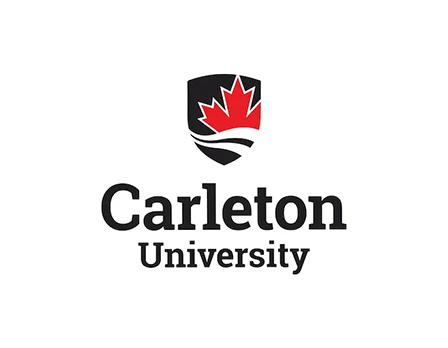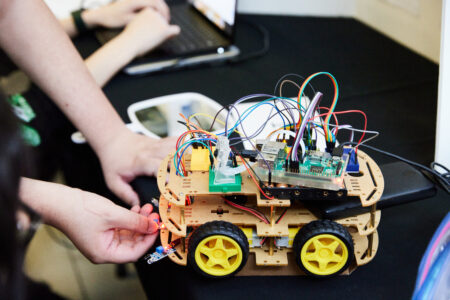Diverse research opportunities. Strong industry connections. Expert faculty. A supportive learning environment. These are just a few reasons why students worldwide choose Carleton University’s Department of Systems and Computer Engineering. Known for its cutting-edge research and personalised approach, the department helps students shape their futures in the strongly innovative tech sector.
For Maged Elaasar, Carleton was the best place to pursue his passion for systems and computer engineering. Born and raised in Los Angeles, he developed an interest in the field while working at IBM, a global leader in software and systems modelling tools. While leading technical projects, he realised that a PhD would allow him to realise several goals: improve the tools he loved while advancing his career and industry.
“Carleton’s renowned research, strong industry connections, and access to leading experts and advanced facilities made it the ideal place to further my studies and contribute to the field,” Elaasar says.

Carleton University’s Systems and Computer Engineering combines hardware, software, and analytics, earning global recognition. Source: Carleton University
Nestled in Ottawa — Canada’s capital often called “Silicon Valley North” — Carleton’s Department of Systems and Computer Engineering offers a range of graduate programmes in Electrical and Computer Engineering and Biomedical Engineering. The department is known for its strengths in real-time systems, hardware-software interfaces, signal processing, telecommunications and networks, software engineering, analytics, and biomedical engineering.
Graduate programmes include master’s and PhD programmes in Electrical and Computer Engineering and Biomedical Engineering. With a focus on interdisciplinary research and real-world applications, the department provides students with the tools and opportunities to push intellectual boundaries and drive meaningful innovation.
For Elaasar, the experience was transformative. His time at Carleton taught him a systematic approach to problem-solving, blending theory with practical applications. Today, in his role at NASA’s Jet Propulsion Lab (JPL), those skills help him tackle complex challenges. “The project management skills acquired, such as planning, risk assessment, and resource management, have enabled me to lead teams effectively and ensure timely and budget-conscious project completion,” he says.
The PhD programme gave Elaasar a solid foundation in both theoretical and practical aspects of systems engineering. Classroom learning is complemented by hands-on research in state-of-the-art laboratories, including the Systems and Machine Intelligence Laboratories, Biomedical Engineering Laboratories, Radio Communications Laboratory, and many more. The experience from lab work and collaborative projects equips students with the skills to solve complex engineering problems — just as it did for Elaasar.
“The interdisciplinary learning emphasis also helped me develop a holistic understanding of systems engineering, crucial for JPL’s multifaceted projects,” he says.

Carleton University’s Systems and Computer Engineering is a world-class leader in computer, electrical, software, communications, and biomedical engineering. Source: Carleton University
One of the most significant benefits of Carleton’s programmes is the opportunity to work with some of the brightest minds in the field. MASc and PhD students often collaborate on research projects with their supervisors, including prestigious fellowships like the Ericsson-Carleton 5G Fellowships. They also engage in projects like “Machine Learning Applied to Network Management.” MEng students can participate in course-based projects with faculty members, allowing them to work on engineering studies, analyses, and design projects.
Mentorship played another key role in Elaasar’s success at Carleton. Throughout his PhD, advisors Dr. Lionel Briand and Dr. Yvan Labiche guided him, offering valuable insights that refined his research methods, critical thinking, and technical writing. This mentorship extended beyond his PhD focus, helping him publish research that would bring wider attention to his work.
“One of my PhD case studies on analysing the UML specification gave me significant visibility at the Object Management Group (OMG),” he says. “This exposure led to my co-chairing UML as an IBM representative alongside colleagues from JPL and Microsoft. The relationship with my JPL colleague, combined with my pioneering PhD work, eventually facilitated my move to JPL.”
Once at JPL, Elaasar was part of a team working to modernise the lab’s systems engineering practices. Though the team faced initial challenges, Elaasar’s problem-solving abilities were put to the test when a survey revealed limited influence on their practice. Drawing on his experiences at Carleton, Elaasar analysed the survey results and wrote a memo to senior leaders, proposing actionable steps to improve the team’s effectiveness. His memo was well-received, leading to his appointment as team leader.
“This success is largely attributed to the critical and technical writing skills honed during my PhD,” he says.
Elaasar’s PhD mentors continued to play a key role in his career even after he left campus. Their support extended co-authorship on research papers and joint projects during his time at IBM. This partnership evolved into a part-time adjunct professor position at Carleton, where Elaasar was able to teach and remain engaged with the academic community.
Learn more about Carleton University’s Department of Systems and Computer Engineering.
Follow Carleton University on Facebook, Instagram, LinkedIn, X, and YouTube.













